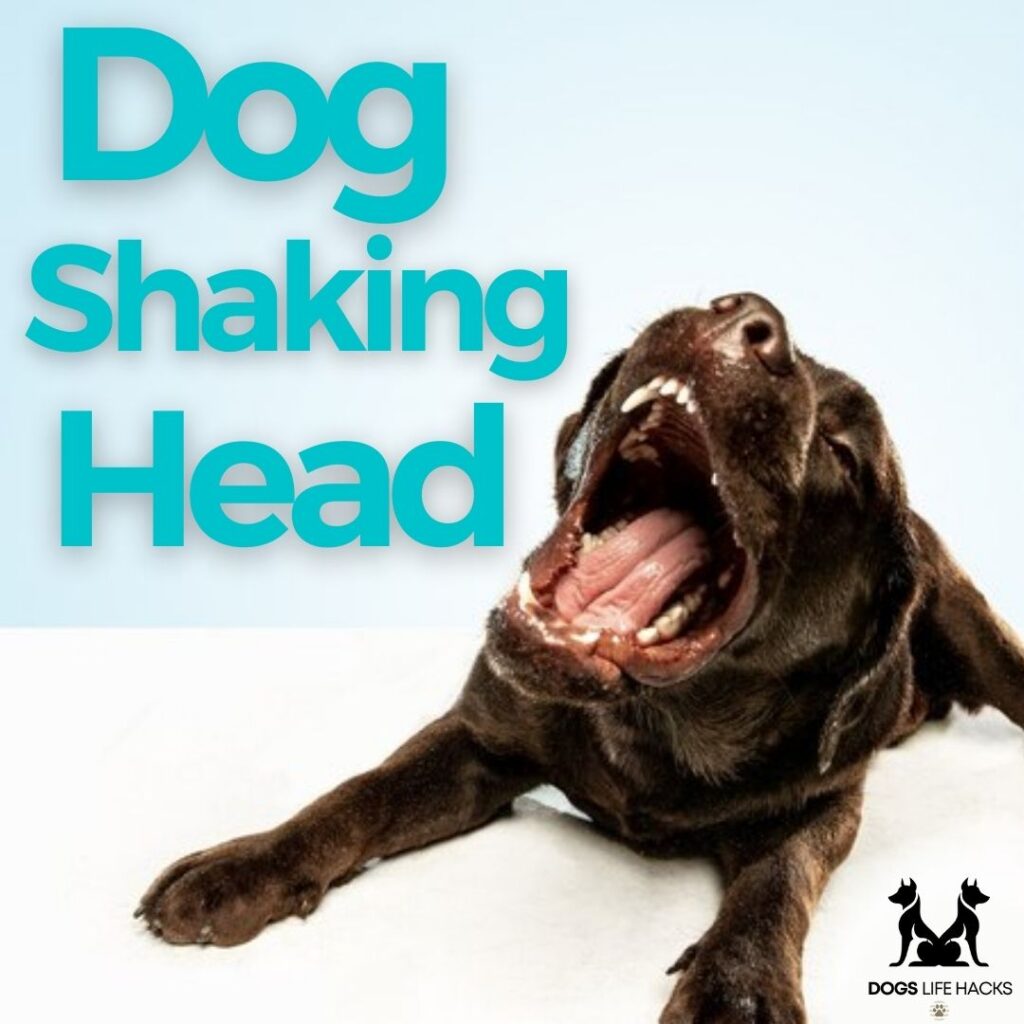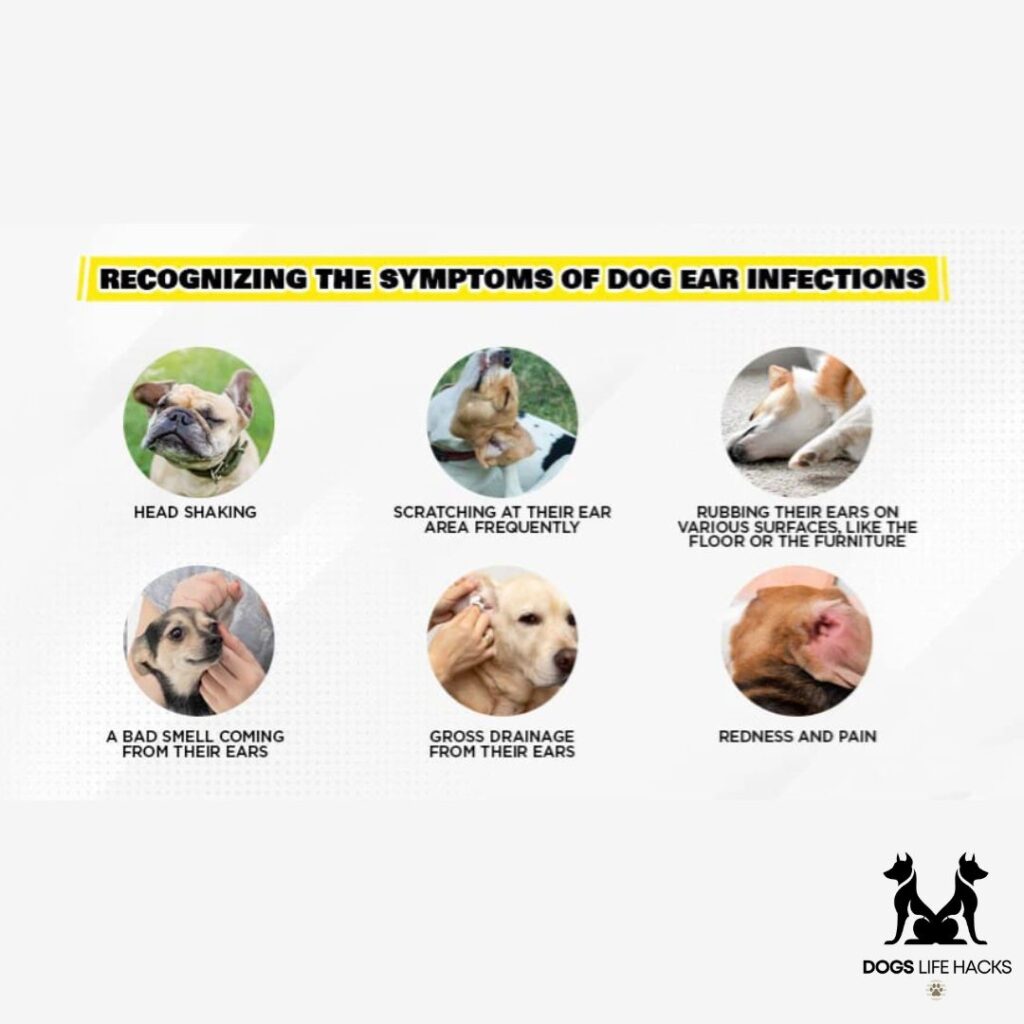Causes of Dog Shaking Head | Symptoms, and Treatment Guide

If you’re a dog owner, you’ve noticed your dog shaking head vigorously.
But what is the reason why a dog shakes its head?
This shaking can be the reaction to a minor irritation or cleaning or a sign of something more serious. Head shaking helps dogs to get rid of foreign objects or clear out their vision.
It can be dangerous and indicate serious health issues. Let’s discuss different reasons behind this act of dogs.
Why Understanding This Behavior Is Important
Knowing the reason behind dog shaking head is crucial for its health. Persistent head shaking can lead to complications, including ear damage or infections. You can take the necessary steps to address and prevent it by recognizing its reasons, and ensuring your dog remains healthy and comfortable.
Common Reasons for Dog Shaking Head
Ear Infections
Ear infection is one of the most common reasons for dogs shaking their heads. Ear infections result in significant discomfort, prompting your dog to shake its head to relieve the irritation.
Symptoms of Ear Infections
The first step in addressing this issue is recognizing the symptoms of ear infections. Common signs include:
- Frequent head shaking or tilting
- Scratching at the ears
- Redness or swelling in the ear canal
- Discharge from the ear
- A foul odor emanating from the ear

Treatment Options
You should visit the veterinarian for treatment of ear infections. Your vet may prescribe:
- Ear drops or topical ointments
- Oral antibiotics
- Cleaning solutions to remove debris from the ear
Early diagnosis can prevent complications and ensure a speedy recovery for your dog.
Ear Mites
Ear mites in dogs are tiny, spider-like pesky parasites that can cause significant discomfort result in dog shaking head, infest the ear canal of dogs, and cause health issues for your furry friend.

Identifying Ear Mites
Ear mites are often visible to the naked eye. Additional signs include:
- Dark, crumbly discharge resembling coffee grounds
- Excessive scratching at the ears
- Redness and inflammation in the ear canal
How to Treat Ear Mites
Treatment for ear mites involves:
- Topical medications to kill the mites
- Cleaning the ears to remove debris
- Follow-up treatments to ensure all mites are eradicated
Consistency is key. Ear mites can be persistent.
Allergies
Allergies are another common cause of dog head shaking. Allergic reactions can lead to itching and discomfort in the ears, and if not counter timely it can lead to cancer.
Common Allergens
Dogs can be allergic to a variety of things, including:
- Pollen
- Dust mites
- Certain foods
- Flea bites
Managing Allergies in Dogs
Managing allergies involves identifying and taking precautions to keep allergens away. Treatment options include:
- Antihistamines or steroids prescribed by a vet
- Hypoallergenic diets
- Regular flea control
Consistent management can reduce allergy symptoms and head shaking.
Foreign Objects in the Ear
Objects like grass seeds, dirt, or small insects can cause discomfort and head shaking.
How Foreign Objects Get Stuck
Foreign objects enter the ear during outdoor activities, especially if your dog runs through tall grass or wooded areas.
Safe Removal Methods
If you suspect a foreign object, it’s important to:
- Avoid using cotton swabs, they can push the object further into the ear canal
- Gently flush the ear with a saline solution
- Visit a veterinarian if the object is not easily removed
Foreign object removal can prevent further irritation and potential infections.
Water in the Ears
Bathing or swimming can lead to head shaking as dogs try to clear the moisture.
Preventing Water-Related Head Shaking
To avoid water from getting trapped in your dog’s ears:
- Use ear-plugs during baths and swimming
- Dry the ears thoroughly with a soft towel after water exposure
Drying Techniques
If water does get into the ears, you can get rid of it by:
- Gently tilt your dog’s head to the side to help the water drain
- Use a vet-approved ear drying solution
Less Common Reasons for Head Shaking
Ear Hematomas
Ear hematomas happen as a result when blood vessels in the ear burst, causing a painful swelling.
Causes and Symptoms
Ear hematomas are often caused by excessive scratching or head shaking.
Symptoms include:
- The swollen, puffy appearance of the ear flap
- Red or purple discoloration
- Sensitivity to touch
Treatment and Prevention
Treatment options include:
- Draining the hematoma
- Surgery to repair the blood vessels
- Treating underlying causes like infections or allergies
Neurological Issues
A less common reason for head shaking is Neurological problems.
Recognizing Neurological Problems
Signs of neurological issues include:
- Loss of senses and coordination
- Abnormal eye movements
- Seizures
- Attitude changes

Treatment Options
Treatment depends on the different neurological conditions, it may involve:
- Medications to control symptoms
- Physical therapy
- Surgery in severe cases
Pain or Discomfort
Dental problems, injuries, or other sources can lead to pain or discomfort leading to head shaking as dogs try to alleviate their distress.
Signs Your Dog Is in Pain
Common signs include:
- Whining or whimpering
- Reluctance to move or eat
- Behavioral changes like aggression or withdrawal
Alleviating Pain and Discomfort
To alleviate your dog’s pain:
- Visit a vet for an examination
- Follow prescribed treatments
- Provide a comfortable and quiet environment for recovery
When to Visit the Vet
Red Flags and Warning Signs
Knowing the right time for veterinary care is essential. Red flags include:
- Continues or severe head-shaking
- Visible signs of pain or distress
- Discharge or foul odor from the ears
- Sudden changes in behavior or coordination
Routine Checkups
Routine examinations can unveil and avert disease before they escalate into severe conditions. Ensuring your dog undergoes periodic veterinary consultations is paramount for surveilling their holistic well-being.
Emergency Situations
You should visit a vet when severe ear infections or suspected neurological issues. Early attention can prevent complications and promote a quicker recovery.
Preventive Measures
Regular Ear Cleaning
Regular ear cleaning is the most effective way to prevent head shaking caused by infections and other issues.
Best Practices for Ear Cleaning
When cleaning your dog’s ears:
- Use vet-approved cleaning solutions
- Avoid inserting objects deep into the ear canal
- Be gentle and thorough
Recommended Products
Use products specifically designed for dog ear care, such as:
- Ear cleaning solutions with soothing properties
- Soft, absorbent cotton balls
- Ear wipes for regular maintenance
Healthy Diet and Lifestyle
A healthy diet and active lifestyle can improve your dog’s health and reduce the issues that cause head shaking.
Importance of Nutrition
Ensure your dog’s diet includes:
- High-quality, balanced nutrition
- Essential vitamins and minerals
- Omega-3 fatty acids for skin and coat health
Exercise and Mental Stimulation
Regular exercise and mental stimulation help maintain and increase your dog’s physical and emotional well-being. Walks, playtime, and interactive toys can keep your dog happy and healthy.

Home Remedies
Natural Remedies
There are several natural remedies to remove minor issues causing head shaking.
- Aloe vera gel for soothing irritated ears
- Apple cider vinegar diluted with water for ear cleaning
- Coconut oil for its antimicrobial properties
First Aid for Immediate Relief
For immediate relief from head shaking:
- Use icing to reduce swelling and inflammation
- Keep your dog calm and prevent them from scratching or shaking excessively
Quick Actions You Can Take
If your dog is shaking its head:
- Inspect the ears for visible issues
- Clean the ears gently if needed
- Contact your vet if the behavior persists
Conclusion
Knowing the reasons behind your dog’s head-shaking is paramount for its well-being and solace. From prevalent culprits like ear infections and allergies to rare afflictions such as ear hematomas and neurological disorders, discerning the symptoms and pursuing suitable remedies is crucial.
Consistent vigilance and preventive care can avert numerous conditions that induce head shaking. Observe your dog’s conduct, uphold a clean lifestyle, and promptly seek veterinary counsel when necessary. Your diligent attention guarantees your dog remains joyful, robust, and at ease.
FAQs
What does it mean if your dog keeps shaking his head?
This shaking can be the reaction to a minor irritation or cleaning or a sign of something more serious. Head shaking helps dogs to get rid of foreign objects or clear out their vision.
How can I tell if my dog has an ear infection?
Scratching of the ear or area around the ear.
Brown, yellow, or bloody discharge.
Odor in the ear.
Redness Swelling Crusts or scabs on inside of the outer ear.
Hair loss around the ear.
Rubbing of the ear and surrounding area on the floor or furniture.
Head shaking or head tilt.
Are ear infections painful for dogs?
Yes, ear infections are painful. Many dogs shake their head and scratch their ears to relieve the discomfort.
Can I put olive oil in my dog’s ears?
Never, do not try to put olive oil, vinegar, shampoo, or any other substance in a dog’s ear.

7 Comments